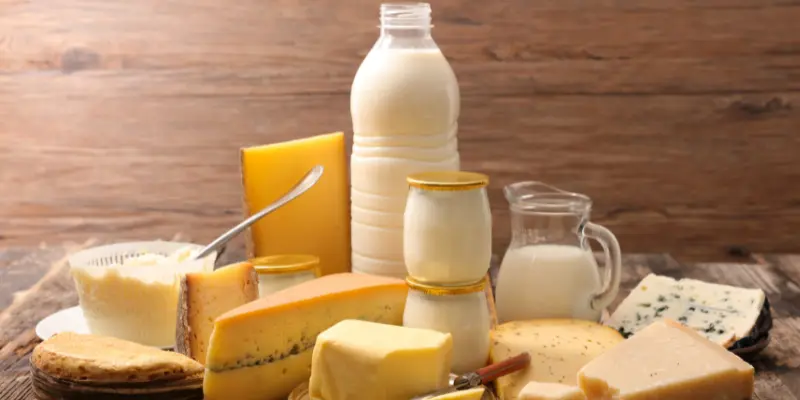Can Dogs Safely Eat Dairy Products? A Complete Guide for Dog Owners
Published: 25 Jan 2025
Can dogs eat dairy? It’s a question that leaves many dog owners scratching their heads. Dairy seems harmless but can cause problems for dogs, from mild discomfort to severe digestive issues. So, should you share your cheese or ice cream with your furry friend?
It’s not a clear-cut yes or no. This article will explore which dairy products are safe for dogs and which can be harmful. You’ll learn about the potential benefits and risks and how to determine if dairy is suitable for your furry friend.
Let’s get started!
Can Dogs Eat Dairy?
Yes, dogs can eat dairy, but it’s not suitable for every pup. Some dairy products are safe in moderation, but like all other human foods, some can be toxic to dogs.
Safe Dairy Products for Dogs
Considering all factors related to lactose intolerance, I researched and refined the list of dairy products that are generally considered safe for dogs, including:
- Cottage Cheese
- Plain Yogurt
- Mozzarella Cheese
- Swiss Cheese
- Gouda Cheese
- Goat’s Milk
- Cream Cheese
- Buttermilk
- Kefir
- Ricotta cheese

Individual dogs may have varying levels of lactose tolerance, so it’s important to monitor their reaction to dairy. Even dairy products that are generally safe for dogs should be offered in moderation to avoid digestive issues or discomfort.
Toxic Dairy Products for Dogs
Now, we know all the safe products. I’m going to share the dairy products that you should avoid at all costs:
- Feta cheese
- Parmesan Cheese
- Blue Cheese
- Whipped Cream
- Heavy Cream
- Sour Cream
- Flavored Yogurt
- Butter
- Chocolate
- Brie Cheese
- Camembert Cheese
What are the Benefits of Dairy Products?
- Dairy products contain several nutrients that support the development of healthy bones, teeth, and muscles.
- Dairy products provide high-quality protein that aids muscle growth and tissue repair.
- They contain essential nutrients like vitamin D, potassium, and phosphorus, which are good for cell repair, blood formation, and circulation.
- Some dog-safe dairy products, like yogurt with live probiotics, may support gut health.
However, these nutrients aren’t essential for dogs if they already have a balanced diet tailored to their needs. Quality dog food already contains the required amount of each nutrient, ensuring your dogs get everything they need without relying on dairy.
Can All Dogs Eat Dairy?
No, not all dogs can eat dairy. Many dogs are lactose intolerant, which means they lack enough lactase, the enzyme needed to break down lactose, the natural sugar in milk and dairy products. Without enough lactase, lactose remains undigested in the gut.
When dogs consume lactose-containing foods, the undigested lactose ferments in their intestines due to the presence of numerous digesting bacteria. This fermentation causes several gastrointestinal issues.
Why Are Some Dairy Products Harmful to Dogs?
Certain dairy products can be toxic or harmful to dogs due to their ingredients, processing methods, or nutritional composition. Here’s a breakdown of the common reasons:
- Certain dairy products are high in fat. Excess fat can trigger pancreatitis.
- Products like feta, parmesan, and processed cheeses contain a lot of salt. Too much sodium can lead to salt poisoning in dogs.
- Many dairy products are flavored or processed with harmful ingredients, including xylitol, garlic, onions, herbs, and chocolate, which can cause severe health issues.
- Sweetened dairy products like ice cream, whipped cream, or yogurt are loaded with sugar. Excess sugar contributes to obesity, diabetes, and dental problems.

What Happens If a Dog Consumes Toxic Dairy?
The symptoms of toxic dairy consumption can vary depending on the type of dairy your dog ingests, but they generally include:
- Vomiting
- Diarrhea
- Excessive Drooling
- Bloating or Gas
- Stomach Pain
- Loss of Appetite
- Tremors or Shaking
- Seizures
- Weakness or Lethargy
- Difficulty Breathing
- Elevated Heart Rate or Hypoglycemia
- Collapse (in severe condition)
If your dog shows any of these symptoms after consuming toxic dairy, contact your vet immediately. The quicker you act, the better the chances for a full recovery. If the symptoms are severe (such as seizures or difficulty breathing), seek emergency care immediately.
- Keep dairy products out of your dog’s reach.
- Educate family members on which foods are toxic to dogs.
- Always check ingredients before giving your dog any new food, especially dairy.
How to Introduce Dairy to Dogs?
Introducing dairy to your dog should be done carefully and gradually. Here’s a step-by-step guide:
1. Check for Lactose Intolerance
Offer a tiny amount of a safe dairy product (e.g., plain yogurt or cottage cheese). Monitor your dog for signs of lactose intolerance. If you notice any, avoid dairy entirely.
2. Choose Dog-Friendly Dairy
If your dog is lactose-tolerant, opt for safe options. Stick to plain, unsweetened, low-fat products like yogurt, goat’s milk, or cottage cheese.
3. Introduce One Product at a Time
Give only one new dairy product at a time. This helps identify any specific sensitivities or allergies. Introduce a small portion and wait 24–48 hours before offering more.
4. Start as a Treat or Topping
Use dairy as an occasional treat or a meal topper instead of a regular diet item. For example, add a spoonful of plain yogurt to their food or use cottage cheese as a reward during training.
5. Monitor Your Dog’s Reaction
Look for positive impacts in your dog’s body, such as regular bowel movements. If your dog shows any digestive upset, stop feeding dairy immediately.
6. Get Professional Advice
If you’re unsure about adding dairy to your dog’s diet, ask your vet to ensure it’s safe for their health and dietary needs.
Can Puppies Eat Dairy?
No. Puppies are generally lactose intolerant after weaning, making most dairy unsuitable.
Puppies may seem like natural candidates for dairy since they rely on milk during nursing. While nursing, puppies produce plenty of lactase. However, once they are weaned, their lactase production decreases, making it harder for them to digest dairy. As a result, consuming dairy can lead to digestive upset, including diarrhea, gas, and bloating.
Instead of offering dairy, it’s best to provide puppies with a balanced diet specifically formulated for their nutritional needs. If you want to introduce any dairy products, consult your veterinarian first to ensure they are safe and suitable for your puppy.
Conclusion
So guys, in this article, we’ve covered can dogs eat dairy? in detail. As a veterinarian with years of experience in canine nutrition, I recommend prioritizing your dog’s health by limiting dairy to occasional treats, and only if your dog shows no signs of lactose intolerance.
Always opt for plain, unsweetened, low-fat dairy products if you share dairy with your pup. Before introducing any new food, including dairy, please consult your veterinarian to ensure it’s safe and suitable for your dog.
Have you ever fed your dog dairy? Share your story and what worked (or didn’t) for your pup!
FAQs
Let’s discuss some frequently asked questions about dogs and dairy.
If your dog is lactose intolerant, it may experience diarrhea, bloating, or gas after eating dairy. Watch for these symptoms within a few hours of consumption. It’s best to avoid dairy products in the dog’s diet if they occur.
Goat’s milk is often easier for dogs to digest because it contains less lactose than cow’s milk. However, it should still be given in moderation and only to dogs without lactose intolerance. Always introduce it slowly to see how your dog reacts.
Yes, frequent consumption of high-fat or sugary dairy products can lead to obesity, pancreatitis, or diabetes. Processed dairy with added salt or harmful ingredients can also strain your dog’s kidneys and heart over time. Stick to dog-safe treats instead of dairy.
Yes, small amounts of dog-safe dairy, like plain yogurt or a bit of unsweetened cheese, can work as treats. However, make sure your dog tolerates dairy first. Use in moderation to avoid upset stomachs or unnecessary calorie intake.

- Be Respectful
- Stay Relevant
- Stay Positive
- True Feedback
- Encourage Discussion
- Avoid Spamming
- No Fake News
- Don't Copy-Paste
- No Personal Attacks

- Be Respectful
- Stay Relevant
- Stay Positive
- True Feedback
- Encourage Discussion
- Avoid Spamming
- No Fake News
- Don't Copy-Paste
- No Personal Attacks





